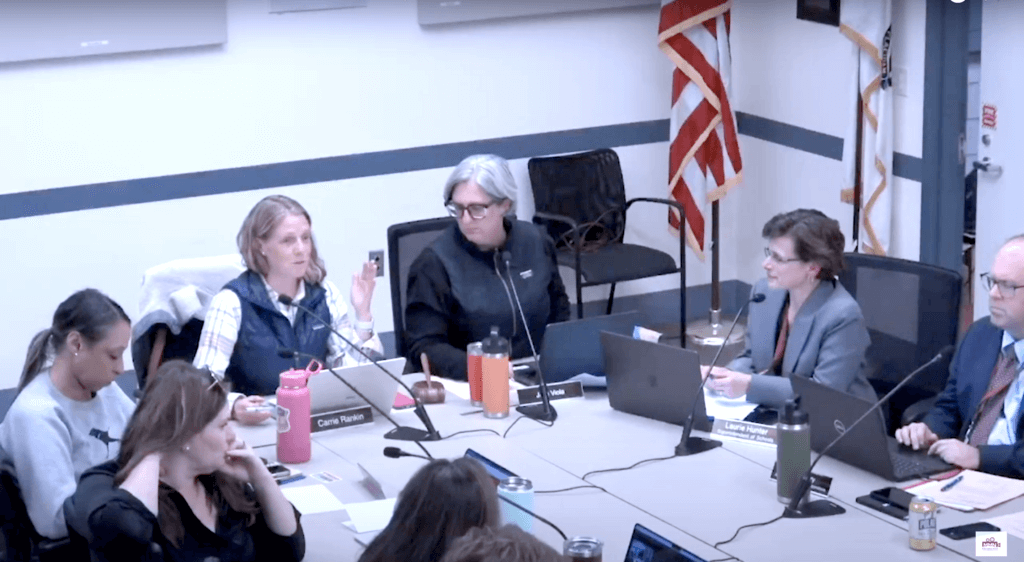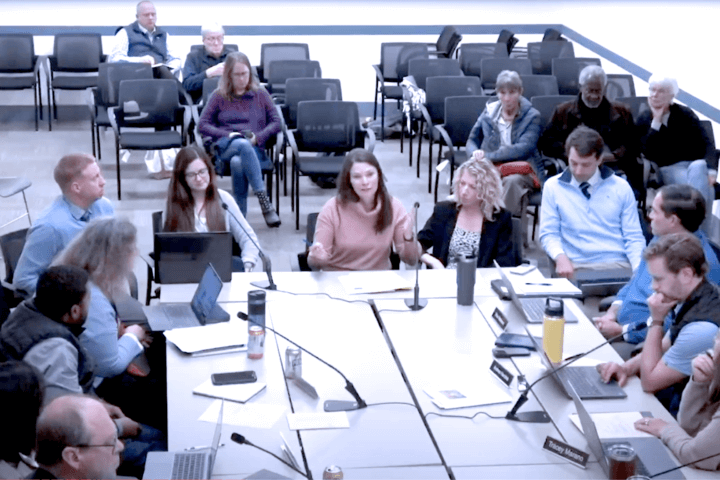By Dakota Antelman and Christine M. Quirk — Dakota@concordbridge.org
Recent survey results yielded some good news about student mental health at Concord Middle School and Concord-Carlisle High School. But the findings also sounded an alarm about the risk of student suicides and left leaders with unanswered questions.
“I’ve been here with a student suicide, so we lose sleep over all this stuff all the time,” Superintendent Laurie Hunter told The Concord Bridge. “Every student is on our minds all the time. So, we need to dig deeper into that.”
School officials from CMS and CCHS presented the results of this year’s Youth Risk Behavior Survey to Hunter and the School Committee on October 8.
Sponsored by Emerson Hospital, the anonymous questionnaire asks students in sixth grade, eighth grade, and high school about topics from cellphone use to mental health. Beyond the Concord Public Schools and Concord-Carlisle High School, nine other districts participated.

Mixed results
Among the bright spots, the rate of CCHS students reporting somewhat high or very high levels of school-related stress has dropped since 2022. Fewer students reported thoughts of self-harm and suicidal ideation at all grade levels. The rate of students who said they don’t have a trusted adult to talk to at school also dropped across all ages compared to 2022.
Though some metrics are headed in the right direction, CCHS Guidance Department chair Alison Nowicki said the students who seriously considered suicide made a plan and followed through on their plan at a higher rate than their peers in other districts. The students who attempted suicide also needed medical attention more frequently than their peers.
“We don’t really have an answer for that one — just something for us to continue to work on and to talk to kids and make sure they’re asking for help when they need it,” Nowicki told the School Committee.
Data about suicide attempts requiring medical attention came from one survey question, according to Emerson Hospital spokesperson Leah Lesser. The question asked whether an attempt “result[ed] in an injury, poisoning, or overdose that had to be treated by a doctor or nurse.”
Many suicide metrics had small sample sizes. As a result, Emerson’s data report cautioned that they “may not represent trends in the population.”
Still, Hunter said the figures are “a really important piece of feedback for us,” as they show local students being more likely to act on suicide plans than their peers in other communities.

‘A message of balance’
As officials discussed mental health problems, they noted several resources already in use, including staff training and initiatives designed to reduce academic stress.
Still troubled by suicide metrics, Hunter said the Youth Risk Behavior Survey alone won’t solve the problem.
“We don’t know which kids have answered what,” Hunter told The Bridge. “We have other tools that help us flag kids, and we have more individual data that we can actually probe a little bit more with.”
Concord School Committee chair Carrie Rankin said mental health concerns factored heavily into recent strategic planning efforts within the school district. She highlighted mental health as a future focus for the district.
“You have to be emotionally well to be able to learn,” she said.
Concord-Carlisle2024YRBSReport-1Concord-Carlisle School Committee chair Julie Viola spoke personally while discussing disproportionate levels of depression, self-harm, suicidality, and bullying among LGBTQ+ students.
“Being a member of the LGBTQ [community], it’s hard to hear it,” she said. “It’s really hard when you put the numbers and there’s kids involved. So thank you. I really appreciate you supporting people that were like me.”
Speaking just under a week after the October 8 meeting, Viola noted the role academic stress plays in student mental health issues.
“For me, it’s a message of balance,” she said. “High performance is absolutely a goal, but not at the cost of well-being. … If we don’t do all the other things, the high performance is going to suffer.”
Moving on from MCAS

Roughly one month after the October 8 risk survey presentation, Concord school leaders grappled with Massachusetts voters’ decision to eliminate the MCAS standardized test as a graduation requirement.
Though Concord residents bucked the rest of the state and favored keeping the requirement, Viola told The Bridge this offers an “an opportunity to reimagine assessments” to better support students’ mental health and learning.
“By continuing to foster an environment where students feel challenged yet supported, we can help them build resiliency and continue to grow the academic muscle that will propel them into whatever is next in their professional and/or academic journey,” Viola said in an email.
“I do think this will be a lot of work to find a statewide benchmark,” Viola added, “but from the point of view of students, I can’t imagine one less test for graduation is a bad thing.”







